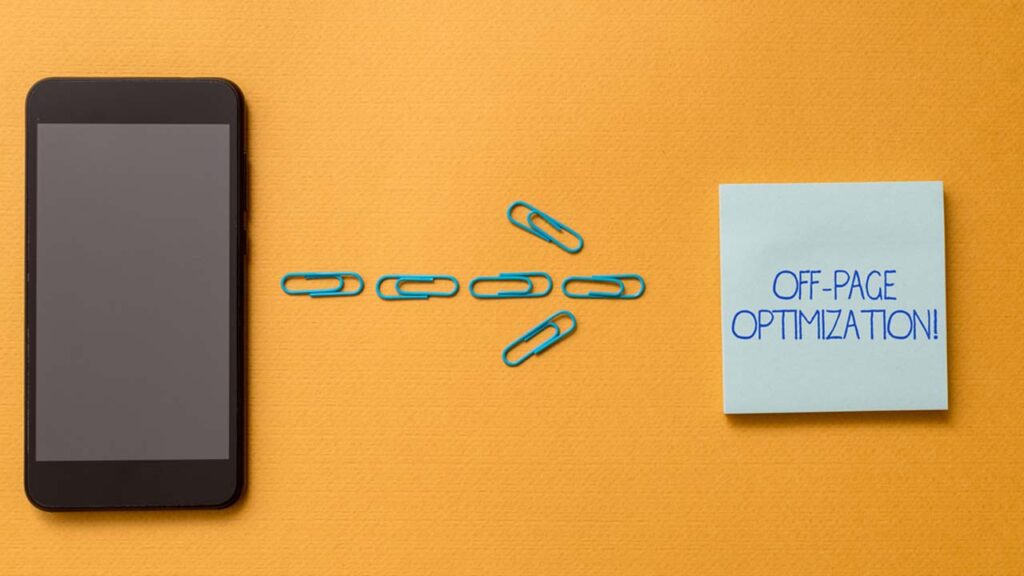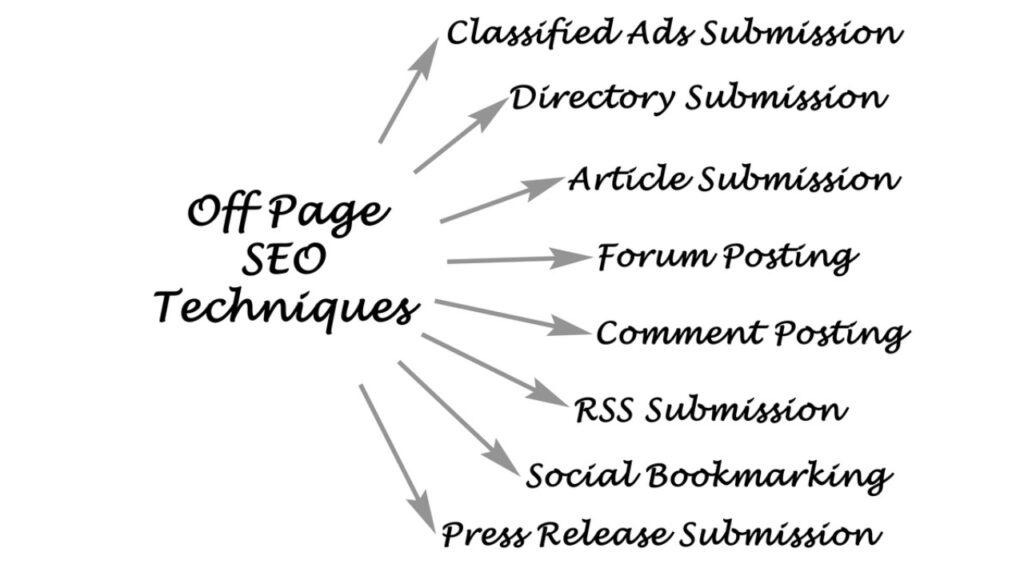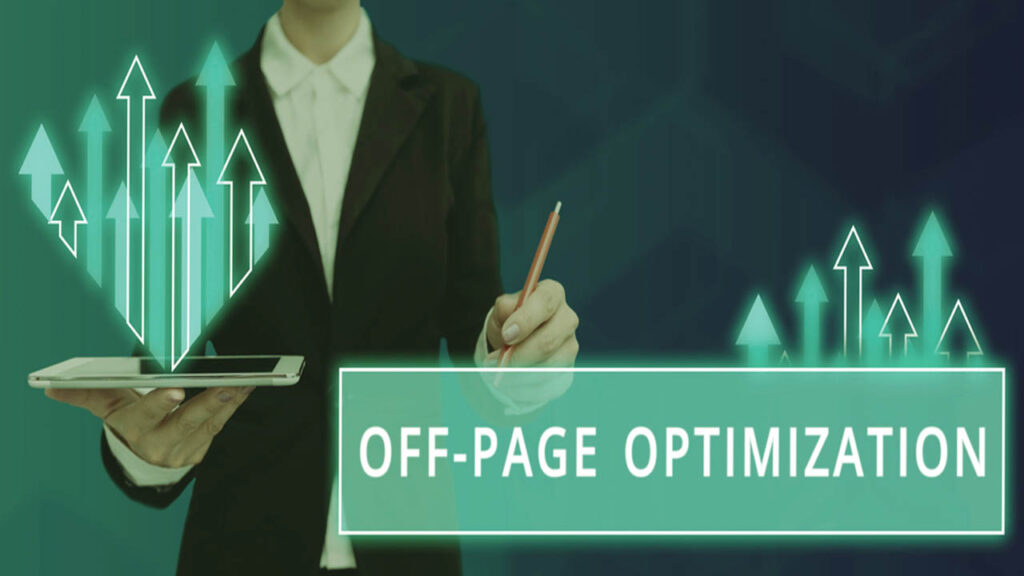SEO Off Page: Top Strategies to Boost Your Rankings
Brett Lewis
Digital Marketing - July 25, 2024

Off-page SEO, or SEO off-page, involves activities conducted outside your website to improve its search engine rankings. This includes acquiring backlinks, social media interactions, and brand mentions. Unlike on-page SEO, which focuses on internal elements, SEO off-page relies on external factors to enhance your site’s authority and trustworthiness. In this article, we’ll explore effective SEO off-page strategies to boost your website’s rankings and credibility.
Key Takeaways
- Off-page SEO focuses on external factors such as backlinks, social media interactions, and online reviews to improve a website’s authority and search engine rankings.
- Key elements of off-page SEO include acquiring high-quality backlinks, engaging on social media platforms, and managing online reviews to build credibility and drive organic traffic.
- Effective link-building strategies—such as guest posting, broken link building, and influencer marketing—are essential for securing valuable endorsements and enhancing off-page SEO performance.
Understanding Off-Page SEO

Off-page SEO refers to the techniques and activities conducted outside of your website to improve its search engine rankings. Unlike on-page SEO, which focuses on optimizing elements within your site, off-page SEO relies on external factors such as backlinks, social media interactions, and brand mentions to enhance your site’s authority and trustworthiness.
Off-page SEO aims to convince search engines of your site’s credibility, authority, and relevance. This is achieved through various signals, primarily off page seo links from other reputable websites, social media engagement, and positive online reviews. These external endorsements act as votes of confidence, demonstrating your site’s value to search engines and users alike.
Definition of Off-Page SEO
Off-page SEO involves optimization strategies implemented beyond your website to enhance its rankings within search engine results pages (SERPs). These tactics include acquiring backlinks, earning brand mentions, and engaging with audiences on social media platforms. While on-page SEO focuses on optimizing elements within the website, such as content and user experience, off-page SEO is all about building your site’s authority and trustworthiness through external endorsements.
Off-page SEO boosts your domain’s authority by securing external links and mentions. This is crucial because search engines like Google use these external signals to gauge the credibility and relevance of your site. In essence, off-page SEO is about creating a network of quality links and endorsements that elevate your site’s standing in the digital ecosystem.
Importance of Off-Page SEO
Off-page SEO is essential in enhancing search engine rankings and increasing organic traffic to your website. Effective off-page SEO efforts can significantly enhance your site’s trustworthiness, relevance, and authority, which are key factors that search engines consider when ranking pages. By focusing on off-page SEO, you can demonstrate your site’s expertise, authoritativeness, and trustworthiness (E-A-T) to both search engines and users, making off page seo important for your online presence.
Google’s algorithms increasingly prioritize user optimization, user intent, and valuable content when ranking pages. By securing high-quality backlinks, encouraging social media engagement, and maintaining a positive online reputation, off-page SEO meets these criteria. These efforts collectively contribute to higher search engine rankings, leading to increased visibility and more organic traffic for your website.
Key Elements of Off-Page SEO

Off-page SEO involves various activities that boost your website’s visibility and authority via external factors. The key elements of off-page SEO include backlinks, social media engagement, and online reputation management. Each of these components plays a vital role in building your site’s credibility and driving more organic traffic.
Backlinks are arguably the most crucial element of off-page SEO, as they act as votes of confidence from other authoritative websites. Social media engagement further amplifies your brand’s reach and visibility, while positive online reviews and reputation management build trust and credibility with both search engines and users.
Backlinks
Also referred to as inbound links, backlinks are links from external websites that direct to your site. They serve as a vote of confidence, indicating to search engines that your content is valuable and credible. High-quality backlinks from reputable and relevant websites can significantly influence your search rankings, as search engines trust these endorsements and are more likely to rank your site higher. For instance, gaining backlinks from authoritative sites like The Guardian or Forbes can substantially boost your site’s credibility.
The impact of backlinks on search performance cannot be overstated. They are a critical factor in Google’s algorithm, forming the foundation of how search engines determine the value of any web page. Websites with a high number of quality backlinks typically enjoy better search rankings. Therefore, building a robust backlink profile should be a cornerstone of any off-page SEO strategy.
Social Media Engagement
Off-page SEO greatly benefits from social media engagement. By actively participating on platforms like:
- YouTube
You can increase your brand’s visibility and drive traffic to your website. Social signals such as likes, shares, and comments can indirectly impact search rankings by reflecting the relevance and popularity of your content.
Engaging with your audience on social media platforms not only enhances your online reputation but also creates opportunities for backlinks. When your content is shared widely, it increases the chances of earning valuable backlinks from other websites. Moreover, social media profiles themselves can rank in search engine results pages (SERPs), further boosting your online presence.
Online Reviews and Reputation Management
Online reviews and reputation management are vital to off-page SEO. Positive online reviews can significantly enhance your business’s reputation and influence potential customers’ decisions. Encouraging satisfied customers to leave feedback on platforms like Google My Business, Yelp, and TripAdvisor can help build a robust online presence and boost SEO.
By actively addressing customer concerns and maintaining a positive reputation, you can establish trust and credibility with both search engines and users. This not only leads to higher search engine rankings but also increases brand recognition and customer loyalty. Monitoring and responding to customer reviews and feedback is an essential part of off-page SEO efforts.
Effective Link Building Strategies

Link building, a key aspect of off-page SEO, involves strategies that help acquire high-quality backlinks, thereby enhancing your site’s authority and search rankings. Various link-building tactics, such as guest posting, broken link building, and influencer marketing, can be utilized to achieve these goals.
Each of these strategies offers unique benefits and can be tailored to fit your specific SEO objectives. From writing and publishing content on external websites to collaborating with influencers, these tactics can help you build a strong backlink profile and enhance your overall SEO efforts.
Guest Posting
Guest posting is the process of composing and publishing articles on other websites to connect with a new audience and secure backlinks. By contributing high-quality content to reputable websites within your niche, you can showcase your expertise, enhance your brand’s exposure, and earn valuable backlinks. When approaching guest posting, it is essential to identify reputable websites, personalize your pitch, and offer valuable content that aligns with the host site’s audience.
Adding a link to your site in the guest post can provide a valuable endorsement, potentially boosting your search engine rankings. It’s a simple yet effective way to increase visibility and credibility. Additionally, guest posting can lead to unlinked brand mentions and increased referral traffic, making it a highly effective link-building tactic.
Broken Link Building
Broken link building involves identifying non-working backlinks on other websites and proposing relevant replacements from your own site. This strategy has several advantages. It is relatively easy to implement and faster than guest blogging, while also providing a substantial avenue to earn natural links. By identifying broken links on relevant websites and reaching out to the site owners, you can offer your content as a replacement, benefiting both parties.
This technique not only helps you gain quality backlinks but also improves the user experience by reducing the number of redirects and 404 pages on the linking site. Broken link building is an efficient way to build your backlink profile and enhance your off-page SEO efforts.
Influencer Marketing
Influencer marketing involves utilizing influential bloggers and social media creators to advertise products, enhance content, and engage new audiences. By collaborating with influencers in your niche, you can ensure your brand’s presence on relevant platforms and gain substantial audience reach.
Reaching out to well-known influencers and leveraging their authority can significantly boost your own authority. Influencer marketing not only helps in gaining high-quality backlinks but also enhances your brand’s visibility and credibility. Utilizing tools like BuzzStream can help manage and schedule personalized outreach emails for link building and content promotion.
Enhancing Off-Page SEO with Content Marketing

By creating high-quality, shareable content that attracts natural backlinks and boosts brand visibility, content marketing greatly contributes to off-page SEO. By focusing on creating valuable content, you can enhance your site’s domain authority and demonstrate expertise, authoritativeness, and trustworthiness (E-A-T) to search engines.
Effective content marketing strategies include creating shareable content, using infographics and visual content, and publishing research-backed articles. These tactics not only help in earning backlinks but also gain media attention and improve overall SEO performance.
Creating Shareable Content
Developing content that resonates with your target audience enhances its potential to be shared across social media platforms and other websites. High-quality content that integrates data, visuals, and interesting facts can boost its shareability and attract natural links. Researching keywords that your audience is searching for can help produce content that ranks better and resonates with your readers.
Repurposing content for different platforms can benefit off-page SEO efforts in the following ways:
- Reaching a wider audience
- Leveraging various social media channels for distribution
- Increasing brand visibility
- Enhancing chances of earning valuable backlinks
Infographics and Visual Content
Infographics and visual content, which can be easily embedded on other websites, are highly effective for earning backlinks. Content that includes eye-catching visuals or infographics is more likely to be shared across social media platforms, increasing engagement and driving traffic to your site.
Visual content tends to hold viewers’ attention longer than text-based content, making it a valuable addition to your content marketing strategy. By creating compelling infographics and visual content, you can enhance user engagement and attract more backlinks, thereby boosting your off-page SEO efforts.
Publishing Research-Backed Articles
The publication of research-backed articles can bolster your authority and credibility, attracting natural backlinks from reputable sites. Thoroughly researched content is more likely to be referenced by other writers and bloggers, increasing your chances of earning high-quality backlinks. Some benefits of publishing research-backed articles include:
- Boosting your authority and credibility
- Attracting natural backlinks from reputable sites
- Increasing your chances of being referenced by other writers and bloggers
Research-backed articles not only enhance your site’s authority but also attract social media shares and mentions, further boosting your off-page SEO. By consistently publishing well-researched content, you can build a strong online presence and improve your search engine rankings.
Local SEO and Off-Page Optimization

Local SEO, which emphasizes optimizing your online presence for localized search results, is especially beneficial for brick-and-mortar stores and service providers. By targeting location-specific keywords and increasing Local Map Pack rankings, local SEO can drive more traffic and conversions for your business. Implementing search engine optimization strategies alongside local SEO can further enhance your online visibility and reach.
Key components of local SEO and off-page optimization include local citations, managing Google My Business, and gathering local reviews. These strategies help establish a professional image, build trust in your brand, and improve local search visibility.
Local Citations
Local citations refer to the mention of your business’s name, address, and phone number (NAP) on websites or directories. Having consistent and accurate NAP citations across trusted directories can significantly improve your local search visibility and make your business easier to find for customers.
Google uses NAP citations to confirm the accuracy of your business information, which is crucial for local SEO. Ensuring consistency in local citations helps establish a professional image and build trust in your brand. Tools like Moz Local Listing Score can help ensure your business details are correctly listed in directories and search engines.
Managing Google My Business
For improved Local Map Pack rankings and enhanced local search visibility, optimizing your Google My Business profile is crucial. A well-optimized Google Business Profile can greatly influence customer engagement and attract more local traffic to your business.
By ensuring your Google My Business profile is complete and up-to-date, you can enhance your online presence and improve your chances of appearing in local search results. This includes adding accurate business information, high-quality images, and regularly updating your profile with new posts and offers.
Gathering Local Reviews
Positive customer reviews and ratings indicate to search engines your business’s reliability and reputation, potentially enhancing your local search rankings. Encouraging satisfied customers to leave reviews on platforms like Google My Business and Yelp can significantly boost your online reputation and visibility.
Engaging with and responding to reviews, both positive and negative, helps build trust with both search engines and potential customers. Google recommends replying to all reviews as it shows that you value customer feedback and are committed to improving your business.
Avoiding Penalties in Off-Page SEO
It is essential to avoid penalties in off-page SEO as they could drastically diminish or even eradicate your search traffic. Penalties can be algorithm-based or manual, and they typically result from guideline violations such as buying links or overusing keywords. To maintain a healthy backlink profile and avoid penalties, it is important to diversify anchor texts, focus on quality over quantity, and regularly monitor your backlinks.
By adhering to best practices and creating original, high-quality content, you can avoid penalties and improve your search engine rankings. Regularly cleaning up your backlinks and ensuring any paid links have a ‘nofollow’ attribute can help prevent penalties related to unnatural links.
Diversifying Anchor Texts
To maintain a natural link profile and prevent penalties, diversifying anchor texts is essential. Using a variety of anchor texts, including brand names and generic terms, helps prevent your links from appearing manipulative to search engines.
By ensuring your anchor texts are diverse and relevant, you can improve your off-page SEO efforts and build a stronger backlink profile. This strategy not only helps in avoiding penalties but also enhances the overall quality of your backlinks.
Focusing on Quality Over Quantity
Superior to a multitude of low-quality links, are high-quality backlinks from reputable sites. Search engines prioritize quality over quantity, and having a few high-quality backlinks can significantly boost your search rankings. Diversifying backlinks from various types of websites can strengthen your off-page SEO strategy and improve your site’s credibility.
Focusing on quality also helps in avoiding penalties, as search engines are more likely to trust and value links from authoritative sources. By building a network of high-quality backlinks, you can enhance your site’s authority and search engine performance.
Monitoring Your Backlink Profile
To avoid penalties related to unnatural links, it’s imperative to regularly monitor your backlink profile. Tools like Google Search Console can help you track your backlinks and identify any potential issues. By disavowing spammy or irrelevant links, you can maintain a strong and compliant backlink profile.
Monitoring your backlinks also allows you to:
- Assess the quality and effectiveness of your link-building strategies
- Ensure that your off-page SEO efforts are on the right track
- Regularly audit and clean up your backlink profile
- Maintain a healthy and authoritative site.
Measuring Off-Page SEO Success
To comprehend the impact of your strategies and make informed decisions, gauging the success of your off-page SEO efforts is fundamental. Key metrics to monitor include the quality and quantity of external links, referral traffic, and social media shares and mentions. Tracking these metrics provides insights into the effectiveness of your link-building tactics and overall SEO performance.
Utilizing SEO tools such as Google Analytics, Ahrefs, and SEMrush can assist in tracking and analyzing these key metrics. These tools provide detailed insights into your backlink profile, keyword rankings, and referral traffic, helping you gauge the success of your off-page SEO efforts.
Key Metrics to Monitor
Domain authority is a critical metric that represents the overall strength of your website’s backlink profile and credibility. The number of backlinks indicates the volume of external sites linking to your content, directly impacting your SEO by reflecting the site’s perceived value and relevance. Referral traffic measures the number of visitors coming to your site from external links, highlighting the role of backlinks in driving traffic.
By consistently monitoring these key metrics, you can evaluate the effectiveness of your off-page SEO strategies and make necessary adjustments to improve performance. Tracking these metrics helps ensure that your efforts are driving the desired results and contributing to your overall SEO goals.
Using SEO Tools
For tracking and analyzing off-page SEO performance, SEO tools such as:
- Google Analytics: helps monitor referral traffic and conversions stemming from off-page SEO efforts
- Ahrefs: provides insights into your backlink profile, allowing you to analyze link quality and quantity
- SEMrush: useful for tracking keyword rankings and identifying backlink opportunities
These tools are indispensable for optimizing your off-page SEO strategy.
Using these tools allows you to:
- Identify strengths and weaknesses in your off-page SEO strategy
- Make data-driven decisions to optimize your efforts
- Ensure that your off-page SEO tactics are effective and aligned with your overall SEO goals
By leveraging the capabilities of SEO tools, you can improve off page seo and optimize your off page seo strategy to achieve better results.
Advanced Off-Page SEO Techniques
Your site’s visibility and authority can be further boosted by employing advanced off-page SEO techniques. These techniques include tracking and leveraging unlinked brand mentions, participating in roundup posts, and leveraging press releases. By incorporating these strategies, you can build a more comprehensive and effective off-page SEO strategy.
Each of these advanced techniques offers unique benefits and can be tailored to fit your specific SEO objectives. Whether it’s gaining exposure through roundup posts or earning high-quality backlinks from press releases, these tactics can significantly boost your off-page SEO efforts.
Brand Mentions Without Links
Brand mentions without links on high-authority sites can enhance your visibility and indirectly contribute to your SEO. Even if these mentions do not include a direct link, they signal to search engines that your brand is being discussed, which can enhance your authority. By monitoring brand mentions and reaching out to publishers, you can often persuade them to add a link, further boosting your off-page SEO.
Brand tracking tools can help you monitor mentions of your brand across various platforms and understand the trend of your brand’s visibility over time. Leveraging unlinked brand mentions can be a powerful addition to your off-page SEO strategy, enhancing your site’s credibility and authority.
Participating in Roundup Posts
Participation in roundup posts offers several benefits, including:
- Gaining links and mentions
- Showcasing your expertise
- Enhancing your online presence
- Increasing website traffic
- Building brand recognition
- Gaining exposure and backlinks with less effort compared to traditional guest posts
Roundup posts are a simple and efficient method to achieve these benefits.
Contributing to roundup posts can provide significant SEO benefits, including enhanced visibility and authority. By actively participating in these posts, you can build valuable relationships with other bloggers and influencers in your niche, further boosting your off-page SEO efforts.
Leveraging Press Releases
Crafting a well-written press release can lead to:
- Media coverage
- High-quality backlinks
- Increased brand visibility
- Attraction of valuable backlinks
By distributing newsworthy announcements or information about your business to media outlets and online platforms, you can enhance your off-page SEO efforts. Ash Turner used The Skyscraper Technique to create a bigger and better version of an existing survey and promote it through press releases, resulting in significant SEO gains.
To optimize press releases for off-page SEO, follow these steps:
- Incorporate relevant keywords into your press release.
- Include anchor text links to your website or specific landing pages.
- This strategy enhances your brand exposure and contributes to building your site’s authority and credibility through quality backlinks from reputable news sites and media outlets.
Summary
In summary, off-page SEO is a critical component of a successful SEO strategy. By focusing on building high-quality backlinks, engaging with audiences on social media, and managing your online reputation, you can significantly enhance your site’s visibility and authority. Effective link-building strategies, such as guest posting, broken link building, and influencer marketing, are essential for acquiring valuable backlinks that boost search engine rankings.
Additionally, leveraging content marketing, local SEO techniques, and advanced off-page SEO strategies can further amplify your efforts. By consistently monitoring your backlink profile, diversifying anchor texts, and focusing on quality over quantity, you can avoid penalties and maintain a strong online presence. Implementing these off-page SEO tactics will help you achieve higher search engine rankings, drive more organic traffic, and build a reputable brand in the digital landscape.
Frequently Asked Questions
What is off-page SEO?
Off-page SEO refers to strategies used outside of your website to boost its search engine ranking, such as obtaining backlinks and engaging with social media audiences. It’s essential for improving your website’s visibility online.
Why is off-page SEO important?
Off-page SEO is important because it helps improve search engine rankings, drive organic traffic, and build website authority and credibility. It ultimately leads to higher rankings and increased visibility for your site.
What are some effective link-building strategies?
Consider implementing guest posting, broken link building, and influencer marketing to acquire high-quality backlinks from reputable websites, boosting your site’s authority and search rankings. These strategies have proven to be effective in building a strong link profile.
How can social media engagement impact off-page SEO?
Social media engagement can positively impact off-page SEO by increasing brand visibility, driving website traffic, and creating opportunities for earning valuable backlinks. Social signals like likes, shares, and comments indirectly reflect the relevance and popularity of your content, which can impact search rankings.
What are the key metrics to monitor for measuring off-page SEO success?
The key metrics to monitor for measuring off-page SEO success include domain authority, backlink count, referral traffic, and social media shares and mentions. Tracking these metrics provides valuable insights to optimize your off-page SEO strategy.
